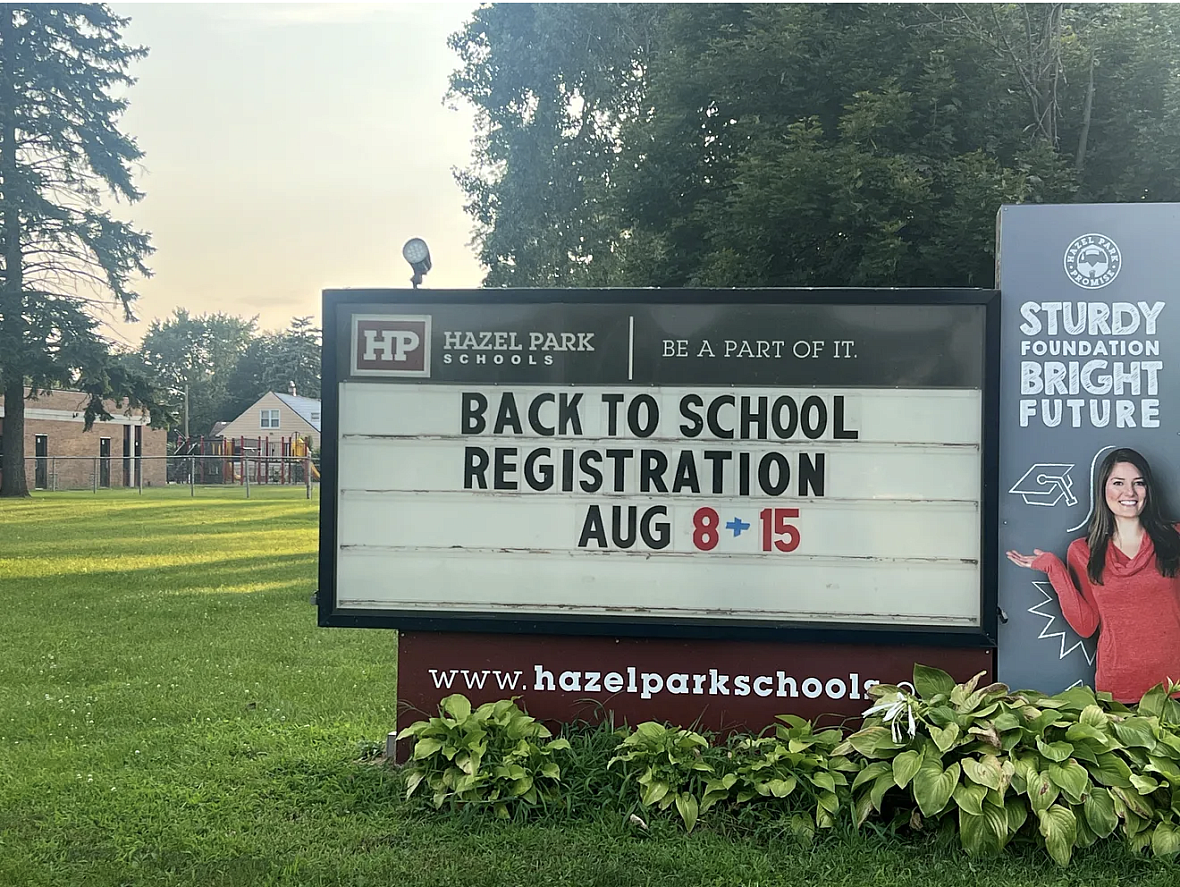Hazel Park Schools to address rising restraint and seclusion against students with disabilities
The story was originally published in Detroit Free Press with support from our 2022 National Fellowship.

A sign outside of Hazel Park Schools' administrative building pictured on Aug. 5, 2025. Hazel Park's board is considering a plan to reduce restraint and seclusion in schools.
Lily Altavena, Detroit Free Press
Hazel Park Schools administrators unveiled a plan at a board meeting Monday evening to better address what leaders acknowledged are increasing instances of restraint and seclusion at a school for students with behavioral disabilities.
The plan follows a Detroit Free Press series that raised questions about the use of restraint and seclusion across Michigan, including at the Edison School, a Hazel Park school for students with behavioral disabilities. Experts, advocates and parents say restraint and seclusion, and particularly overuse of these tactics in schools, can traumatize children who may already be vulnerable.
School staff members in Hazel Park secluded students with disabilities 330 times and restrained them 298 times in the first half of the 2023-24 school year, according to state data, which has not yet been updated to include the second half of the school year. The state data shows only the number of instances of restraint and seclusion by district, it is not separated by school, but board documents indicate that concern about restraint and seclusion is mainly based on instances recorded at the Edison School in elementary grades.
The working plan to reduce use of these tactics would include randomly auditing paperwork to ensure proper restraint and seclusion processes are being followed, repurposing some seclusion rooms at Edison and working on more personalized plans to better address behavioral challenges for students experiencing restraint and seclusion on a regular basis. The district is also putting together a committee with behavioral professionals, educators and at least one parent. Leaders have proposed using a new program called Ukeru to train staff to better help students in crisis.
Megan Papasian-Broadwell, Hazel Park's executive director of student services, said at the meeting that district leaders were compelled to act when officials noted an increase in restraint usage.
"We recognize there is a significant need for us to put together a reduction plan … so we have the right supports in place to ensure that these numbers go down," she told board members.
Melissa Freel, the parent of a former Edison student and the co-leader of Michigan Advocates to End Seclusion and Restraint, said her organization sent Hazel Park's board a letter on June 18 raising alarm over high seclusion and restraint numbers, which put the district "at the head of the pack" for seclusion among districts in Michigan.
"I'm so happy because it means the spotlight is being shown on this practice in this school and it means ... somebody's paying attention now and that means the practice has got to change," she said.
Seclusion frequently involves a staff member confining a student to a room alone. Some schools have rooms specifically meant for secluding children. A former Edison student told the Free Press that seclusion rooms were about the size of a cubicle, with three bare walls and a door. Restraint involves adults physically restraining a student.
Michigan law allows schools to use seclusion and restraint only as a last resort, if a student poses a danger to themselves or others. But the Free Press found state restraint and seclusion legislation passed in 2016 didn't include any consequences, and whether schools follow those laws — or accurately report how many times students are secluded or restrained — is largely an honor system.
Restraint and seclusion across Michigan
In the 2022-23 school year, Michigan public school staff members reported secluding students with disabilities 11,910 times — the most recorded in a single school year since the state started reporting this data in the 2017-18 school year — and restraining them 9,076 times.
Hazel Park had the most instances of seclusion, 272, recorded in the second quarter of the 2023-24 school year, out of any district in the state, following by Lincoln Park Schools and Genesee Intermediate School District. The second quarter runs from October to December.
For the entire 2022-23 school year, Hazel Park recorded using seclusion 392 times on 34 different students with disabilities, the fifth-highest number of seclusions of all public school districts in the state that year. Figures to calculate Hazel Park's rate of using the tactics in comparison with other districts weren't readily available.
Amy Kruppe, superintendent of Hazel Park Schools, said there is a waiting list to attend Edison, which accepts students experiencing high levels of trauma, which was exacerbated for some students during the coronavirus pandemic. While restraint and seclusion numbers have increased, Kruppe said, the district is not pointing fingers at Edison staff, but trying to strengthen support for them. The school has seen turnover, particularly in aides for students with disabilities, and better training may help.
"It's not an easy job," she said.
Freel's group and other advocacy organizations have for several years called for strengthened legislation to eradicate the use of seclusion and restraint in Michigan classrooms, but it's unclear whether there's an appetite in Lansing to make any changes.
Though Gov. Gretchen Whitmer's spokesman in a statement in November 2022 wrote that it was "clear" Michigan could do more to curtail the use of these tactics in schools, state lawmakers have not done anything to address conspicuous gaps in the law, such as a lack of consequences for not following restraint and seclusion laws.
Lawmakers leading education committees said in December 2023 they could not commit to any type of reform. Key groups representing Michigan teachers have been resistant to the idea of changes to the system, arguing there are already few protections for teachers in classrooms when violence strikes.
Crisis intervention to cut down on restraint, seclusion
Many school districts are already using crisis intervention programs, some as a way to cut down on restraint and seclusion, aiming to intervene in a crisis situation long before a student's behavior spins out of control or turns violent. Edison already regularly trains staff annually in nonviolent crisis intervention, but district administrators hope the new program they're considering, Ukeru, will better serve Hazel Park.
"I think we have to disrupt the current processes in place to get another option and see if this works and helps," Kruppe said.
Ukeru is touted as "a trauma-informed approach" with tools that don't require teachers to resort to restraining a student. According to Ukeru's website, school districts and behavioral health facilities using the program have reported decreases in staff injuries, the use of restraint and seclusion.
The program would cost the district an estimated $12,610, primarily for training, which would cover:
- Verbal and nonverbal communication techniques to help de-escalate students who may be showing aggression.
- Physical redirection techniques to minimize injury and harm.
- What the organization claims is a technique to block aggressive students without using restraint.
Freel's son, Bennett Solomond, attended the Edison School in 2018 and 2019. There, Bennett said he experienced trauma over being restrained and secluded, without adequate intervention to get to the root causes of his behavioral issues.
In 2019, Bennett's parents moved him to a suburb of Pittsburgh, in an effort to escape Michigan schools, and specifically restraint and seclusion. There, Bennett has flourished and is about to enter his senior year of high school, she said, at a traditional high school where he's taking honors and Advanced Placement courses in preparation for college.

Melissa Freel, left, gets a hug from her son Bennett Solomond in their Pittsbugh living room on Wednesday, Nov. 2, 2022
Mandi Wright, Detroit Free Press
She said hearing that Hazel Park is trying to change makes her "ecstatic."
"I really think they need to have strong parent representation on a planning committee and really be prepared to dig deep into their current practices," she said.
Monday's meeting was a special board workshop. The board will likely decide whether to use Ukeru and further consider the plan to reduce restraint and seclusion in a meeting later this month.

